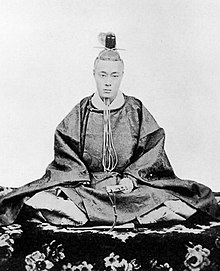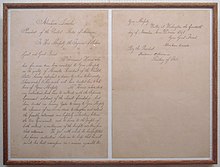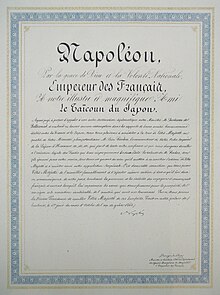63:
43:
29:
79:
62:
119:, which once referred to an independent ruler who did not have an imperial lineage. Its literal meaning is "Great Lord/Prince" or "Supreme Commander". In the
438:
206:. As formal language is extremely important in diplomacy, the connotations of most alternative terms were found to be inappropriate, and so
261:
268:. Still, a "tycoon" is a person of great influence without formal title, whereas a "taikun" was a ruler without imperial lineage.
375:
311:
260:, where it has assumed the meaning of "a person of great wealth, influence or power". The term is notable as a
433:
42:
244:
20:
75:
8:
428:
106:
during its brief usage in
English language diplomatic notes in the 1860s, is an archaic
340:
160:
32:
232:
371:
307:
107:
265:
251:
218:
172:
134:
111:
51:
133:
in relations with foreign countries, as an attempt to convey that in fact not the
365:
301:
55:
47:
397:
141:
was the point of call in relations with foreign countries. The official name is
95:
71:
422:
164:
67:
344:
334:
243:
of Japan and predecessors are said to have had the title (大和大君), read "
120:
28:
125:
80:
Diplomatic Record Office of the
Ministry of Foreign Affairs (Japan)
278:
236:
159:
For purposes of foreign relations, the term was first used by the
115:
256:
130:
123:, this word was used as a diplomatic title designating the
336:
Journal of World
History Vol. 26, No. 2 (June 2015)
367:American English spelling: an informal description
420:
230:
199:
183:
142:
224:
193:
177:
149:
93:
339:. University of Hawaii Press. p. 280.
332:
303:The I ching in Tokugawa thought and culture
190:, but he also could not use the term "king"
306:. University of Hawaii Press. p. 66.
163:in an attempt to extricate Japan from the
217:Still going back 1,000 years and more in
363:
299:
61:
41:
27:
439:Titles of national or ethnic leadership
264:that comes from a different meaning in
421:
333:MARK RAVINA, Emory University (2015).
214:in formal diplomatic communications.
171:certainly could not call himself the
70:to the Japanese "Taïcoun" nominating
19:For other meanings of "tycoon", see
13:
14:
450:
210:was chosen to best represent the
364:Cummings, Donald Wayne (1988).
390:
357:
326:
293:
54:, announcing the departure of
1:
286:
110:term of respect derived from
16:Japanese title for the shogun
7:
271:
231:
200:
184:
143:
10:
455:
370:. JHU Press. p. 277.
18:
250:The word has entered the
225:
194:
178:
167:system of relations. The
150:
94:
262:Japanese word in English
21:Tycoon (disambiguation)
83:
76:Duchesne de Bellecourt
59:
39:
300:Wai-ming, Ng (2000).
65:
45:
31:
74:, in replacement of
434:Japanese honorifics
78:, 23 October 1863.
58:. 14 November 1861.
161:Tokugawa shogunate
154:, Tycoon of Japan)
84:
60:
40:
33:Tokugawa Yoshinobu
377:978-0-8018-3443-1
313:978-0-8248-2242-2
221:, Empress Kōgyoku
144:Nihon-koku Taikun
137:, but rather the
446:
413:
412:
410:
408:
394:
388:
387:
385:
384:
361:
355:
354:
352:
351:
330:
324:
323:
321:
320:
297:
266:Japanese culture
252:English language
242:
240:
228:
227:
205:
203:
197:
196:
189:
187:
181:
180:
173:Emperor of Japan
155:
153:
152:
146:
135:Japanese Emperor
101:
99:
98:
52:Tokugawa Iemochi
454:
453:
449:
448:
447:
445:
444:
443:
419:
418:
417:
416:
406:
404:
396:
395:
391:
382:
380:
378:
362:
358:
349:
347:
331:
327:
318:
316:
314:
298:
294:
289:
274:
222:
191:
175:
147:
91:
56:Townsend Harris
48:Abraham Lincoln
24:
17:
12:
11:
5:
452:
442:
441:
436:
431:
415:
414:
402:Dictionary.com
389:
376:
356:
325:
312:
291:
290:
288:
285:
284:
283:
273:
270:
15:
9:
6:
4:
3:
2:
451:
440:
437:
435:
432:
430:
427:
426:
424:
403:
399:
393:
379:
373:
369:
368:
360:
346:
342:
338:
337:
329:
315:
309:
305:
304:
296:
292:
281:
280:
276:
275:
269:
267:
263:
259:
258:
253:
248:
246:
239:
238:
234:
220:
215:
213:
209:
202:
186:
174:
170:
166:
162:
157:
145:
140:
136:
132:
128:
127:
122:
118:
117:
113:
109:
105:
102:, spelled as
97:
90:
89:
81:
77:
73:
69:
64:
57:
53:
49:
44:
38:
34:
30:
26:
22:
405:. Retrieved
401:
392:
381:. Retrieved
366:
359:
348:. Retrieved
335:
328:
317:. Retrieved
302:
295:
277:
255:
249:
216:
211:
207:
168:
165:Sino-centric
158:
138:
124:
114:
103:
87:
86:
85:
68:Napoleon III
50:to "Tycoon"
36:
25:
72:Léon Roches
35:, the last
429:Edo period
423:Categories
407:7 December
383:2010-10-04
350:2021-03-27
319:2010-10-04
287:References
241:, 594–661)
121:Edo period
66:Letter of
46:Letter of
247:Taikun".
398:"tycoon"
345:43901753
272:See also
108:Japanese
233:Kōgyoku
219:history
116:I Ching
112:Chinese
374:
343:
310:
257:tycoon
245:Yamato
212:shōgun
208:taikun
169:shōgun
139:shōgun
126:shōgun
104:tycoon
88:Taikun
37:taikun
341:JSTOR
279:Taikō
237:tennō
201:kokuō
185:Tennō
151:日本国大君
131:Japan
409:2015
372:ISBN
308:ISBN
282:(太閤)
226:皇極天皇
254:as
129:of
425::
400:.
229:,
198:,
195:国王
182:,
179:天皇
156:.
96:大君
411:.
386:.
353:.
322:.
235:-
223:(
204:)
192:(
188:)
176:(
148:(
100:)
92:(
82:.
23:.
Text is available under the Creative Commons Attribution-ShareAlike License. Additional terms may apply.


